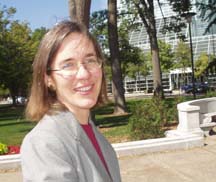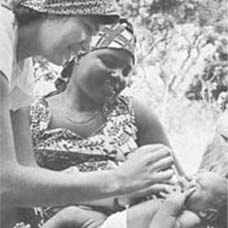
Cameroon RPCV Margaret Krome says Why Don't We See Images of Terror Caused by U.S.?
Why Don't We See Images of Terror Caused by U.S.?
by Margaret Krome
Sunday night our family watched on television the footage of the Sept. 11 attacks on the World Trade Center made by two French documentary filmmakers who happened to be there and courageously filmed its horrors.
This footage as well as newspaper, radio and other six-month anniversary accounts of the attacks and the lives of those left behind affected me predictably. I've cried over the losses suffered and felt waves of anger at those who gave themselves permission to kill and hurt so many.
Watching the incredible images of people stumbling through the dust and hearing the screaming was to witness the power of images. I fretted when I had to put our children to bed before learning the fate of Tony, the rookie firefighter in the fire company closest to the World Trade Center, around whom the documentary was focused. Our sympathies were aroused by being given a clear picture of his life. A person's image makes that person real. One imagines the person's hopes, sufferings, privations, joys.
The Sept. 11 images are also politically powerful, as President Bush demonstrated on Monday in using this and other coverage to seek support for his expanding war on terrorism.
But what about the images, equally relevant, not shown us? I don't mean the evacuees in the elevators and stairwells, or people on fire at ground zero. The media channels that have reveled in fueling our nation's fury and heartache over Sept. 11 have failed to share the plight of other people for whom this story has meaning.
What about the 350,000 Afghan refugees in the Maslakh camp in Afghanistan, 100 of whom died a day from exposure and starvation this winter?
What about the billions of people whose daily impoverished, powerless reality fuels popular anger against the United States around the world?
Even as Bush uses Sept. 11 images to gain support for expanded military action around the world, many in that world see such military actions as another example of the United States forcing its way upon poor and powerless people.
World health officials say that poverty threatens to wipe out decades of medical advances in many countries. Wages are so low that, for example, banana workers in Ecuador earning $56 a month can't pay for food or adequate housing, much less health care or education for their children. Education levels are dropping. Hunger is increasing. Economic opportunity is declining and child labor increasing.
It is no accident that terrorists focused on the World Trade Center. What surprises me is that they didn't attack the International Monetary Fund or World Bank as well. For these institutions have forced on indebted developing countries economic and trade policies that serve only the United States and other industrialized nations. Poor nations are punished for spending on their citizens' health and education, the building blocks of true development.
"Structural adjustment policies" require poor countries to pay debts by exporting raw commodities, whose price bottoms out through the sheer numbers of such countries, perpetuating those nations' debt.
But where are the stories and images of victims of U.S. military and trade policies? Without them, the U.S. public cannot understand the rest of the world's fury against our nation.
We are easily led to support military actions that exacerbate that anger. And without hope for policy changes, angry victims resort to terrorism.
Even as we require the images of Sept. 11 to grasp fully its horror, memorialize its victims and shed our tears, we need images of world poverty to force policy changes to alleviate world anger that will otherwise inevitably fuel more horrific acts of terrorism.
Margaret Krome is a Madison resident.
Copyright 2002 The Capital Times








